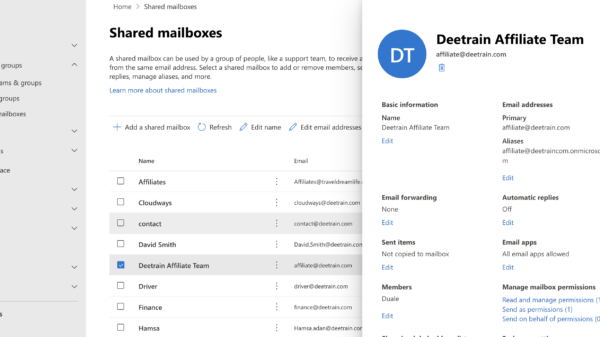
Desktop Support is concerned with consumers and computer peripherals. This service would include break-fix and proper technical guidance and support, which is usually provided remotely to support and fix any operating system concerns on a user’s computer and the company’s networks, devices, and printers.
Desktop support is a distinct form of technical support, even though it serves a similar goal as a help desk; technicians access the afflicted computer directly using desktop support, coordinating with the end-user via a virtual chat or phone line.
Desktop support is most commonly utilized in the workplace, where networks are closely regulated and monitored. This increased level of network monitoring makes it simpler to accomplish things this way.
What is the role of a desktop support specialist?
An information technology (IT) professional who maintains computer hardware and software systems is a desktop support expert. They are in charge of installing new software, maintaining updates, and providing technical assistance. Typical responsibilities involve:
- Troubleshooting and resolving technical problems with hardware or software systems
- Understanding and troubleshooting technological difficulties with people over the phone, in person, or via online chat.
- Identifying the need for system reconfiguration and then delivering it.
- Evaluating user requirements and offering technical solutions such as patches, updates, or enhancements.
- Monitoring customer records and documenting technical support processes.
- Responding to inquiries as soon as possible and giving information on the appropriate installation, maintenance, and usage of technological systems.
- Completing complete client installs by performing data backups, updating systems as required, and installing new software or hardware alternatives.
We will discuss some aspects of desktop help support in this article which will clear all your doubts.
Salary on average
Desktop support experts are generally full-time employees; however, their hours may vary. Because many products offer customer assistance 24 hours a day, seven days a week, certain desktop support professionals may work in the evenings, overnight, on weekends, and during vacations.
Although detailed pay information for desktop support experts is not available, related job titles offer an indication of what these individuals may anticipate earning:
$20.78 per hour for desktop support technicians
Help desk analysts are paid $18.37 per hour.
$15.68 per hour for technical support experts
Total hourly wages range from $7.25 to $46.80.
Field Engineer is the premier global employment marketplace for freelancing desktop support technicians.
Requirements for a desktop support expert
- Education
- Apple Care Mac Technician (ACMT)
- Comp TIA A+
- Microsoft Technology Associate (MTA)
- HDI Customer Service Representative
- Training
- Communication
- Skills
- Customer service
- Attention to detail
- Problem-solving
Everything you need to know about the requirements of a Desktop support expert.
Education
Employers usually demand a Bachelor’s Degree in Computer Science or a similar subject for desktop support experts. In some situations, an associate’s degree or a high school certificate may be sufficient if the candidate has solid experience dealing with technological systems and can demonstrate exceptional expertise.
Certifications
Companies frequently look for desktop support experts certified in specific applications or systems relevant to the work they will be conducting.
Apple Care Mac Technician (ACMT)
For experts who wish to work with Apple devices, ACMT certification is essential. Online training is offered, allowing you to study and learn at your speed. On-site instruction at an Apple Certified Training Center is also an option.
To get the ACMT certificate, you must pass both the Apple Service Basics Exam and the Apple Certified Macintosh Technician (ACMT) exam with at least 80%.
Comp TIA A+
The Comp TIA A+ accreditation is the industry benchmark for IT excellence. The course covers hardware, software, computer operating systems, networking, security, hardware and network problems, mobile devices, operating processes, and other advancements.
Microsoft Technology Associate
MTA certificates demonstrate a fundamental technical understanding of Microsoft platforms. Numerous certification examinations are available that focus on various Microsoft systems, database foundations, software development fundamentals, and other topics.
HDI Customer Service Representative
Even though this is not a technical certification, it is pretty helpful for desktop support experts. This training program will teach you the skills you need to deliver excellent customer service.
It entails defusing problematic behavior, employing analytical thinking to diagnose problems, and participating in active listening to understand the customer’s position.
Communication
Desktop support experts must explain highly technical information to unfamiliar users with software, hardware, and other technologies. Strong communication skills are required to bridge the knowledge gap and offer clients readily understandable and actionable insights.
Skills
These experts are equipped with the necessary skill set to handle complex client encounters and sophisticated technological difficulties.
Customer Service
Desktop support experts frequently deal with customers who have problems with their computers, which may be frustrating. These professionals should have exceptional customer service abilities, such as active listening and empathy, to soothe consumers and give a satisfying conclusion.
Attention to detail
This talent assists these experts in detecting minor flaws, such as defective code or a mistake in the instructions, which can significantly influence a user’s experience with a technological product.
Problem-Solving
A desktop support specialist’s work includes assessing problems and executing remedies. These experts must be able to collect information from customers systematically and then utilize this information and their critical thinking skills to diagnose and address technical difficulties.
Workplace for desktop support specialists
Desktop support professionals generally serve off-site clients. They might accomplish this over the phone by providing help at a call center. This profession may need long hours spent at a desk working on a computer.
Support specialists operate as part of a team to fulfill customer satisfaction objectives and determine the best strategies to make calls brief yet effective.
Desktop support experts also collaborate closely with others in the organization who have IT-related positions. They may be in charge of paperwork, on-site technical assistance, and other responsibilities for IT supervisors and managers.
Some desktop support professionals also offer on-site help to customers, visiting their offices and installing and upgrading in person. In some cases, the specialist is required to travel for a portion of the task. Lifting, bending, reaching, and walking may be required while installing systems in person.
How to Get a Job as a Desktop Support Specialist
The steps below will help you prepare for a career in this field.
- Earn a bachelor’s degree
- Gain a professional certification
- Gain experience with operating systems
- Show your customer service skills
- Prepare your resume
- Seek technical support positions
Earn a bachelor’s degree
A Bachelor’s Degree in Computer Science is desired, although relevant technical fields may be considered. Consider taking courses in a range of technological systems to broaden your expertise.
Gain a professional certification
Get technical certifications from manufacturers and other certifying organizations. Seek advanced certification in the programs you wish to work with the most. This step may assist you in obtaining work, advancing your career, or increasing your earning potential.
Gain experience with operating systems
Desktop support experts should have hands-on expertise with Windows, Linux, and other operating systems. This expertise can be obtained through your degree program, a relevant career, or volunteer opportunities administering technological systems and databases for nonprofits.
Show your customer service skills.
It is better for individuals interested in becoming desktop support experts to work in a ticketing-based help system. Any demonstrable expertise with customer service, on the other hand, is advantageous since it demonstrates your ability to interact effectively with consumers and solve problems under pressure.
Prepare your Resume
Create a resume that showcases your technical knowledge and customer service abilities. Make a list of every technical certificate you’ve obtained. Consider using the job description language to better match your credentials with the expectations of your potential employers.
Seek technical support positions
Look for desktop support experts in your desired location, and at organizations, you want to work for. Other job titles to think about include desktop support technician and IT desktop support.
What are the Duties and Responsibilities of a Desktop Support Specialist?
The ultimate goal of a Desktop Support Specialist is to assist members of an organization’s employees in ensuring that all computers, network connections, and software are correctly working.
A multitude of tasks is required to accomplish this. According to our research of job listings, these are the primary duties and responsibilities of a Desktop Support Engineer.
- Troubleshoot Technology Issues
- Install and Maintain Equipment and Software
- Provide Client Service
Troubleshoot Technology Issues
Desktop Support Specialists offer educated counsel and use their experience to assist end-users in resolving technological problems.
Whether a laptop is unable to connect to the Internet, a software platform is malfunctioning, or a server cannot save data files, Desktop Support specialists must use their knowledge to find a solution.
Install and Maintain Equipment and Software
When new workers are employed, Desktop Support Specialists are in charge of configuring their workstations. This involves ensuring that new workers have access to the programs, apps, and other technology required to carry out their responsibilities.
Desktop Support Specialists maintain, repair, and upgrade equipment and establish and install computers and software.
Provide Client Service
Employees of the businesses are, in essence, clients of the Desktop Support specialist. As a result, specialists must give exceptional service to fulfill all of the customer requirements.
It includes training new employees on how to use the company’s software and apps, responding to ad hoc and emergency requests, organizing workshops for new features or new software as they are implemented, and instructing executives on the most suitable and cost-effective technical solutions for the firm.
What Kinds of Desktop Support Positions Are Available?
Many people associate desktop support with a variety of concepts. However, one thing stays constant. Desktop assistance may be an excellent first job or perhaps a rewarding career.
What Do You Need to Know to Succeed in Desktop Support?
A mechanic understands that an engine runs on three things: gasoline, fire, and air. Leaving missing one element might imply leaving out hundreds of others. Similarly, desktop support technicians must understand the components of a computer, operating system, and network and how they connect.
That’s what troubleshooting entails. For example, you don’t need to rebuild the engine if it needs a new spark plug.
What Are the Technologies Used in Desktop Support?
Desktop support technicians are in charge of everything with a screen in the company, including personal gadgets. They must support an incredible number of devices, including virtual computers and cloud services.
What Kinds of Hardware Are Used in Desktop Support?
It’s critical to understand that desktop support technicians do more than merely solve problems. Everything with moving components needs a little oil now and again. Of course, this is figuratively speaking. (Please do not lubricate your motherboard.) In reality, computers require a lot of physical care as well.
What Kinds of Software Are Used in Desktop Support?
Software, like hardware, requires upkeep. You may believe there are no moving parts; however, this is not the case. It is necessary to clean hard discs. Apps must be weeded out. Memory, too, might benefit from a tune-up now and then.
The operating system is in charge of everything on the computer. Fortunately, there are several simple tools available to assist you.
Why Should You Be Aware of Software Updates?
When it comes to security, one of the essential tasks of a desktop support technician is to ensure that everyone’s software is up to date. Software flaws might let intruders into your system.
A PC running an outdated OS version is analogous to having a cutting-edge alarm system and then leaving your windows open.
Why Do You Need to Understand Desktop Monitoring?
A check engine light is seen in automobiles. Operating systems will also notify you when anything is incorrect. On Windows, desktop support technicians have access to a plethora of monitoring tools. To be proactive, you should look through Performance Monitor and Event Viewer.
Why Do You Need to Understand Cloud-Based Desktop Support?
Mechanics used to only work with mechanical parts. They are now dealing with sophisticated computing devices. In desktop support, the same thing has happened. Previously, it was bare metal, motherboards, and operating systems.
Desktop support technicians are increasingly dealing with cloud-based technologies. The majority of support positions require some cloud administration. Don’t fall behind.
How Does Desktop Support Work in Practice?
Desktop assistance is one of the most rewarding jobs available since you are interacting with people and technology. Consider your first phone call from your father. He was having difficulty.
You weren’t sure what was wrong, but you found it out. Consider doing that a dozen times a week. You are a wonder worker as a desktop support technician. You’re a conjurer. If you’re doing a good job, you’ll be the first person they call when something goes wrong.









